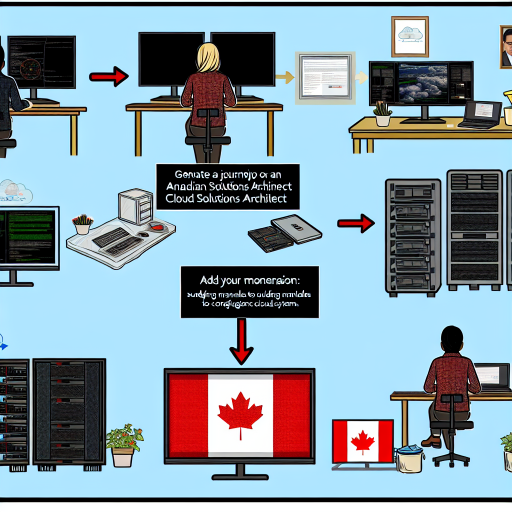Emerging Technologies Impacting Cloud Architecture
Artificial Intelligence and Machine Learning
Artificial intelligence is transforming cloud architecture significantly.
Cloud solutions are increasingly integrating AI capabilities.
This integration enhances data processing and analytics.
Machine learning models optimize resource allocation efficiently.
As a result, organizations save costs and improve performance.
Moreover, AI enhances security through advanced threat detection.
Cloud architects must adapt to these evolving technologies.
Serverless Computing
Serverless computing is reshaping the way applications are built.
This model allows developers to focus on code and logic.
Consequently, they can scale applications automatically based on demand.
Architects must design systems that leverage serverless architectures.
Additionally, this approach reduces operational overhead significantly.
It encourages innovation by minimizing infrastructure management tasks.
Multi-Cloud Strategies
Multi-cloud strategies provide flexibility and resilience for enterprises.
Organizations choose multiple cloud providers to avoid vendor lock-in.
This approach also enhances disaster recovery options.
Architects need to ensure interoperability among different platforms.
Furthermore, understanding compliance across multiple environments is vital.
They must consider data latency and governance issues.
Edge Computing
Edge computing is gaining traction as data generation increases.
This technology processes data closer to the source, reducing latency.
It is essential for real-time analytics and IoT applications.
Cloud architects must integrate edge solutions into their designs.
This ensures better performance and responsiveness for users.
Additionally, it alleviates bandwidth constraints on cloud resources.
Unlock Your Career Potential
Visualize a clear path to success with our tailored Career Consulting service. Personalized insights in just 1-3 days.
Get StartedBlockchain Technology
Blockchain technology is influencing security and data integrity in clouds.
It enables decentralized data management across networks.
This decentralized approach can enhance transparency in transactions.
Cloud architects need to explore blockchain integration possibilities.
Furthermore, they must address scalability issues related to blockchain.
Adapting cloud solutions to incorporate blockchain is vital for innovation.
The Role of Artificial Intelligence in Cloud Solutions
Enhancing Cloud Infrastructure
Artificial intelligence (AI) significantly improves cloud infrastructure management.
It automates routine tasks, reducing the need for manual oversight.
This automation leads to faster deployment times and operational efficiency.
Moreover, AI systems optimize resource allocation, ensuring scalability.
Data Analytics and Insights
The integration of AI fosters advanced data analytics capabilities.
Cloud solutions architects can leverage AI to uncover actionable insights.
These insights help businesses make informed decisions quickly.
Furthermore, predictive analytics can forecast future trends accurately.
Improving Security Protocols
AI enhances security measures within cloud environments.
It identifies and mitigates potential threats in real-time.
This proactive approach strengthens overall data protection strategies.
Additionally, AI can analyze patterns, improving threat detection capabilities.
Streamlining DevOps Processes
AI tools streamline DevOps pipelines, facilitating smoother workflows.
They automate code testing and deployment, reducing human error.
This leads to quicker release cycles and better product quality.
Consequently, development teams can focus on innovation rather than maintenance.
Natural Language Processing Applications
Natural language processing (NLP) enables efficient data interaction.
AI-driven chatbots improve customer service within cloud applications.
These chatbots handle inquiries efficiently, boosting user satisfaction.
Moreover, NLP can help in managing vast datasets through querying.
Driving Innovation with AI
AI serves as a catalyst for innovation in cloud technologies.
It empowers architects to design smarter cloud solutions.
New AI-driven features enhance user experiences dramatically.
As a result, companies that embrace AI gain a competitive edge.
Trends in Cloud Security and Compliance for Canadian Enterprises
Growing Importance of Cloud Security
Cloud security continues to rise as a critical focus for enterprises across Canada.
Organizations now prioritize data protection and risk management strategies.
Companies invest heavily in robust security frameworks to mitigate potential breaches.
Furthermore, the shift to remote work has amplified the need for stronger security measures.
Regulatory Compliance Challenges
Compliance with Canadian laws is becoming increasingly complex for cloud solutions architects.
New regulations, such as the Personal Information Protection and Electronic Documents Act, require strict adherence.
Organizations must ensure systems are designed for compliance from the ground up.
Additionally, staying informed about updates in regulations is essential for success.
Adoption of Zero Trust Security Models
The Zero Trust security model is gaining traction among Canadian enterprises.
This framework emphasizes verification and continuous monitoring of all users.
It effectively minimizes risks associated with unauthorized access.
Companies prioritize this model to enhance their overall security posture.
Integration of Artificial Intelligence
Artificial Intelligence (AI) is transforming cloud security solutions in Canada.
AI enhances threat detection and response capabilities significantly.
Moreover, machine learning algorithms analyze patterns and identify anomalies quickly.
This integration helps enterprises respond proactively to potential security incidents.
Focus on Data Sovereignty
Data sovereignty remains a top concern for Canadian cloud users.
Organizations need assurance that their data is stored in compliance with local laws.
This drives demand for cloud providers with Canadian-based data centers.
Furthermore, companies are implementing policies ensuring data localization.
Strengthening Employee Training and Awareness
Employee training is crucial for maintaining cloud security and compliance.
Organizations are investing in security awareness programs for all staff members.
Training prepares employees to recognize and mitigate security threats effectively.
Consequently, a knowledgeable workforce fosters a culture of security accountability.
You Might Also Like: Top Industries Hiring Cloud Solutions Architects in Canada
The Shift Toward Multi-Cloud Strategies in Canada
Understanding Multi-Cloud Strategies
Multi-cloud strategies involve using multiple cloud service providers.
This approach enhances flexibility and minimizes vendor lock-in.
Canadian companies are increasingly adopting multi-cloud models.
They seek to optimize costs and performance through diverse platforms.
Key Drivers of Multi-Cloud Adoption
Several factors are driving the increase in multi-cloud strategies.
First, businesses demand greater control over their cloud resources.
Second, security and compliance are high priorities for organizations.
Additionally, companies want to leverage specific services from different providers.
This includes advanced analytics, machine learning, and edge computing.
Challenges of Multi-Cloud Strategies
Despite the advantages, implementing multi-cloud strategies can be challenging.
Complexity in management often increases significantly.
Organizations must ensure seamless integration between different platforms.
Furthermore, data governance and regulatory compliance present additional hurdles.
Companies may find managing costs difficult across multiple systems.
Future Outlook for Multi-Cloud Strategies
The future of multi-cloud strategies appears promising in Canada.
Organizations will likely continue focusing on hybrid cloud solutions.
Emerging technologies will facilitate easier integration of various platforms.
Cloud providers are also enhancing their service offerings to attract customers.
This competitive environment will drive innovation and improve services for users.
Uncover the Details: Understanding Data Migration as an ERP Consultant
Skills and Certifications for Future Cloud Solutions Architects
Technical Skills
Cloud solutions architects must master various technical skills.
Proficiency in cloud platforms like AWS, Azure, or Google Cloud is essential.
Architects should understand cloud security and compliance frameworks.
Knowledge of containerization technologies, such as Docker and Kubernetes, is crucial.
Furthermore, familiarity with serverless architectures will set candidates apart.
Soft Skills
Effective communication skills are vital for collaborating with stakeholders.
Problem-solving abilities help architects tackle complex cloud challenges.
Leadership skills are necessary for guiding teams through projects.
Additionally, adaptability is important due to rapid technological changes.
Certifications to Consider
Certifications validate expertise in specific cloud technologies.
The AWS Certified Solutions Architect is a popular choice among professionals.
Azure Solutions Architect Expert certification enhances credibility in the job market.
Google Cloud Professional Cloud Architect certification offers recognition for skills.
Emerging Skills for the Future
Future architects should develop skills in AI and machine learning integration.
Understanding DevOps practices will be increasingly important.
Knowledge of multi-cloud strategies will become a key asset.
Additionally, familiarity with data analytics tools will enhance cloud capabilities.
Continuing Education
Cloud technology evolves rapidly, requiring ongoing education.
Professionals should attend workshops and webinars to stay updated.
Online courses on platforms like Coursera and Udacity are helpful resources.
Networking with other professionals can provide valuable insights and opportunities.
Uncover the Details: Career Path of a Cloud Solutions Architect in Canada

The Importance of DevOps Integration in Cloud Architecture
Enhancing Collaboration Between Teams
DevOps promotes a culture of collaboration between development and operations teams.
This collaboration enhances communication and fosters teamwork effectively.
As a result, teams can respond more quickly to changes and issues.
This integration leads to reduced development time and higher quality products.
Automating Processes for Efficiency
Automation is a key benefit of integrating DevOps into cloud architecture.
It streamlines workflows and minimizes repetitive tasks.
This ultimately frees up valuable human resources for strategic initiatives.
By automating code deployment, teams achieve greater consistency and reliability.
Improving Incident Response and Recovery
DevOps integration enhances incident response times significantly.
Quick feedback loops help identify issues swiftly.
As a result, organizations can resolve incidents more effectively.
Moreover, this leads to increased system uptime and improved user satisfaction.
Supporting Continuous Integration and Continuous Deployment (CI/CD)
CI/CD practices are vital to modern cloud architecture.
They allow for frequent updates with minimal disruption.
The DevOps approach synchronizes development and operations workflows effectively.
This integration supports continuous delivery of high-quality software.
Fostering a Culture of Continuous Improvement
Integrating DevOps promotes a mindset of continuous improvement.
This mindset encourages teams to iterate on processes and tools regularly.
As a result, they can adapt to technological advancements and market demands faster.
This culture ultimately drives innovation within the organization.
Emphasizing Security Practices
DevOps integration supports the implementation of robust security measures.
Security becomes a shared responsibility among all team members.
This collaborative approach leads to more secure cloud environments.
Furthermore, it ensures compliance with industry standards and regulations.
Uncover the Details: Networking Tips for Aspiring Cloud Solutions Architects
Sustainability Trends in Cloud Computing and Green Data Centers
The Importance of Sustainability
Cloud computing drives significant energy consumption worldwide.
As a result, businesses are under pressure to adopt sustainable practices.
Green data centers play a vital role in minimizing environmental impacts.
They use energy-efficient technology to reduce carbon footprints.
In Canada, the emphasis on sustainability is growing rapidly.
Adoption of Renewable Energy Sources
Companies increasingly shift to renewable energy for their data centers.
Solar and wind energy have become popular choices for powering operations.
Furthermore, many firms are seeking partnerships with renewable energy providers.
This transition helps organizations achieve sustainability goals effectively.
Innovations in Cooling Technologies
Efficient cooling systems are crucial in green data center designs.
Liquid cooling and hot aisle/cold aisle containment are popular trends.
These technologies significantly reduce energy usage in data centers.
Additionally, they enhance overall operational efficiency.
Embracing Automation and AI
Artificial intelligence significantly enhances data center management.
AI optimizes energy consumption by analyzing usage patterns.
This technology also predicts maintenance needs, reducing downtime.
Automated systems contribute to smoother operations and energy efficiency.
Green Certifications and Standards
Obtaining green certifications is becoming increasingly essential.
Standards like LEED and Energy Star guide organizations towards sustainability.
These certifications demonstrate a commitment to environmental responsibility.
Moreover, they can improve brand reputation in the marketplace.
Regulatory Environment in Canada
The Canadian government actively encourages sustainable practices.
Regulations promote renewable energy use and energy efficiency.
Organizations must comply with these regulations to thrive in the market.
Failure to do so can result in penalties and loss of reputation.
Future Prospects for Cloud Solutions Architects
Cloud solutions architects must stay updated on sustainability trends.
They play a pivotal role in integrating sustainable practices into designs.
Continued education on emerging technologies will be crucial.
Ultimately, architects who prioritize sustainability will lead industry advancements.
Evolving Job Market and Career Opportunities for Cloud Leaders
Current Landscape of Cloud Solutions
The demand for cloud solutions architects is rapidly increasing in Canada.
Organizations now prioritize cloud adoption to enhance their operations.
This trend creates ample career opportunities for skilled professionals.
Cloud computing skills are highly sought after across various industries.
Businesses recognize the need for cloud expertise to drive innovation.
Emerging Technologies Shaping Cloud Solutions
New technologies are reshaping how cloud solutions are implemented.
Artificial intelligence and machine learning play significant roles.
These technologies help in optimizing cloud resources and performance.
Additionally, serverless computing is gaining traction among organizations.
This approach minimizes infrastructure management and boosts efficiency.
Skills Required for Future Cloud Leaders
Cloud architects must possess a diverse skill set to succeed.
They should have a strong foundation in computer science principles.
Knowledge of industry-standard cloud platforms is essential.
Moreover, specialization in security protocols is increasingly important.
Certification in cloud technologies can enhance job prospects.
Networking and Professional Development Opportunities
Networking is crucial for career advancement in cloud computing.
Joining professional organizations offers numerous benefits.
Conferences and seminars are excellent avenues for learning and collaboration.
Online courses provide opportunities to upskill and keep up with trends.
Participating in community projects can also enhance visibility and expertise.
The Future of Work in Cloud Solutions
Remote work continues to influence the cloud solutions landscape.
Companies embrace flexible work arrangements to attract top talent.
This shift necessitates strong communication and collaboration skills.
Cloud architects must adapt to diverse work environments.
Emphasis on continuous learning will be vital for future success.
Additional Resources
Digital Transformation in Healthcare: Technology Acceptance and …




